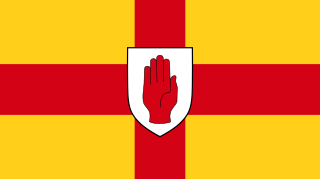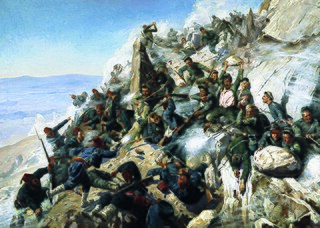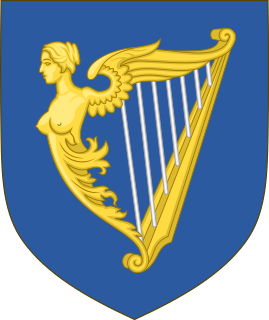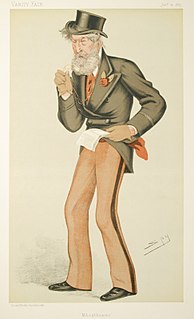
Ulster is one of the four traditional Irish provinces. It is made up of nine counties: six of these constitute Northern Ireland ; the remaining three are in the Republic of Ireland.

1877 (MDCCCLXXVII) was a common year starting on Monday of the Gregorian calendar and a common year starting on Saturday of the Julian calendar, the 1877th year of the Common Era (CE) and Anno Domini (AD) designations, the 877th year of the 2nd millennium, the 77th year of the 19th century, and the 8th year of the 1870s decade. As of the start of 1877, the Gregorian calendar was 12 days ahead of the Julian calendar, which remained in localized use until 1923.

Charles Stewart Parnell was an Irish nationalist politician who served as a Member of Parliament (MP) from 1875 to 1891, also acting as Leader of the Home Rule League from 1880 to 1882 and then Leader of the Irish Parliamentary Party from 1882 to 1891. His party held the balance of power in the House of Commons during the Home Rule debates of 1885–1886.

The Irish Parliamentary Party was formed in 1874 by Isaac Butt, the leader of the Nationalist Party, replacing the Home Rule League, as official parliamentary party for Irish nationalist Members of Parliament (MPs) elected to the House of Commons at Westminster within the United Kingdom of Great Britain and Ireland up until 1918. Its central objectives were legislative independence for Ireland and land reform. Its constitutional movement was instrumental in laying the groundwork for Irish self-government through three Irish Home Rule bills.

Pōmare IV, more properly ʻAimata Pōmare IV Vahine-o-Punuateraʻitua, was the Queen of Tahiti between 1827 and 1877. She was the fourth monarch of the Kingdom of Tahiti.

The Home Rule League (1873–1882), sometimes called the Home Rule Party, was an Irish political party which campaigned for home rule for Ireland within the United Kingdom of Great Britain and Ireland, until it was replaced by the Irish Parliamentary Party. The Home Rule Confederation of Great Britain was a sister organisation in Great Britain.
Events in the year 1912 in Ireland.

The Great Railroad Strike of 1877, sometimes referred to as the Great Upheaval, began on July 14 in Martinsburg, West Virginia, after the Baltimore and Ohio Railroad (B&O) cut wages for the third time in a year. This strike finally ended some 69 days later, after it was put down by unofficial militias, the National Guard, and federal troops. Because of economic problems and pressure on wages by the railroads, workers in numerous other cities, in New York, Pennsylvania and Maryland, into Illinois and Missouri, also went out on strike. An estimated 100 people were killed in the unrest across the country. In Martinsburg, Pittsburgh, Philadelphia and other cities, workers burned down and destroyed both physical facilities and the rolling stock of the railroads—engines and railroad cars. Local populations feared that workers were rising in revolution such as the Paris Commune of 1871.

Clare was a parliamentary constituency in Ireland, represented in the Parliament of the United Kingdom. From 1801 to 1885 it returned two Members of Parliament (MPs) to the House of Commons of the United Kingdom of Great Britain and Ireland.

John O'Connor Power was an Irish Fenian and a Home Rule League and Irish Parliamentary Party politician and as MP in the House of Commons of the United Kingdom of Great Britain and Ireland represented Mayo from June 1874 to 1885. From 1881, he practised as a barrister specialising in criminal law and campaigning for penal reform.
The term New Departure has been used to describe several initiatives in the late 19th century by which Irish republicans, who were committed to independence from Britain by physical force, attempted to find a common ground for co-operation with groups committed to Irish Home Rule by constitutional means. In the wake of the Fenian Rising of 1867 and the unpopular executions which followed it, Fenianism was popularised and became more moderate, while the Home Rule movement was edging toward radicalism at the same time, laying the framework for the alliance. The term was coined by John Devoy in an anonymous article in the New York Herald on 27 October 1878 in which he laid out a framework for a new policy.

Charles James Patrick Mahon, known as the O'Gorman Mahon or James Patrick Mahon, was an Irish nationalist journalist, barrister, parliamentarian and international mercenary.

Alice Stopford Green was an Irish historian and nationalist.

The 1907 Victorian Football Association season was the 31st season of the Australian rules football competition. The premiership was won by the Williamstown Football Club, after it defeated West Melbourne in the final by eighteen points. It was the first premiership won by Williamstown, in its 24th season of senior competition.
The 1880 Drogheda by-election was fought on 2 March 1880. The byelection, to the United Kingdom House of Commons, arose through the death of the incumbent Home Rule League Member of Parliament, William Hagarty O'Leary. It was won by Benjamin Whitworth, who had previously sat for the seat as a Liberal but on this occasion announced that he supported the Home Rule cause. He had resigned his current seat, at Kilkenny, in order to run. He received 382 votes as against 181 for J. McCoan, candidate of the Home Rule League. It was reported that 150 Conservative voters had abstained in response to a circular from the party.
The 1879 Clare by-election was fought on 15 May 1879. The byelection was fought due to the resignation of the incumbent Home Rule MP, Bryan O'Loghlen, to become Attorney General of the Colony of Victoria. It was won by the Home Rule candidate James Patrick Mahon.
The 1877 Clare by-election was fought on 13 August 1877. The byelection was fought due to the death of the incumbent Home Rule MP, Sir Colman O'Loghlen. It was won by the Home Rule candidate Sir Bryan O'Loghlen. The result was remarkable in that O'Loghlen did not seek the nomination and was elected without his consent. He refused to take his seat as he was Attorney-General of Victoria. This position was considered an office of profit and thus disqualified him from membership of the House of Commons. A select committee was established to consider the issue and reported in 1879. The found that this was the case and the seat was declared vacant. Some controversy remained because O'Loghlen's position was in a colony and not in the United Kingdom. A writ was moved for another by-election in 1879.
The 1877 Huntingdonshire by-election was fought on 29 June 1877. The byelection was fought due to the death of the incumbent Conservative MP, Henry Carstairs Pelly. It was won by the Conservative candidate Viscount Mandeville.
The 1877 Tipperary by-election was fought on 15 May 1877. The byelection was fought due to the death of the incumbent Home Rule MP, William Frederick Ormond O'Callaghan. It was won by the Home Rule candidate Edmund Dwyer Gray.
The 1876 Leitrim by-election was fought on 14 July 1876. The byelection was fought due to the succession to a peerage of the incumbent Conservative MP, William Ormsby-Gore. It was won by the Home Rule candidate Francis O'Beirne.










